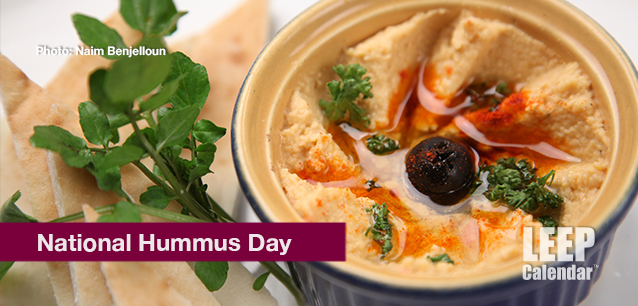 AD
AD
Today is: July 04
Scroll to explore events active on this date.
Additional Events on LEEP
LEEP INK FEATURES

May Blooms: Events in May 2025
Along with October, May is one of the most densely packed months of the year. It's before the summer humidity and the last whole month of the school year. The weather is warming in t...

Sweet June 2025
The solstice on the 20th marks the onset of summer (Northern Hemisphere) or winter (Southern Hemisphere). Many people, particularly in Europe, North America and Asia, will be embarking o...

Events in April 2025
Spring has sprung in the north, and the first hints of Autumn are on the horizon in the south. April is the month spring (or fall) gets underway, and it is filled with religious celebrations, including the Mu...
About International Hummus Day
Ends: May 13, 2025
DESCRIPTION:
International Hummus Day began in 2012 to encourage people to gather and eat together while celebrating this humble food.
Hummus is a popular Middle Eastern and Mediterranean paste made from cooked, mashed chickpeas blended with tahini, olive oil, lemon juice, garlic, and various spices. The dish has a rich history going back centuries.
The word "hummus" is derived from the Arabic word for chickpeas, "ḥimmaṣ." Chickpea cultivation in West Asia and the Mediterranean stretches back to 7,000 BC. The earliest documented recipes for hummus are in cookbooks from the 13th century in Cairo, Egypt. Falafel, made from fava beans and ground chickpeas, is another classic Arabic dish using several of the same ingredients rumored to have originated in Cairo.
One of the essential ingredients in hummus, tahini (sesame seed paste), also has a long history in the region. The use of sesame seeds dates back to ancient civilizations, such as the Assyrians and Babylonians, around 3,000 BC. It is unclear when tahini and chickpeas were first combined.
The history of hummus encompasses the cultural and culinary traditions of various Middle Eastern and Mediterranean societies, including the Ottomans, the Levantines, the Persians, and the Arabs. As the Ottoman Empire expanded, hummus spread to various parts of the empire, including Greece, Turkey, and the Balkans. This expansion led to regional variations in the dish, with different countries and cultures adding their unique twists to the basic recipe.
In the 20th century, hummus gained popularity in the Western world, particularly in the United States and Europe, as a healthy and delicious food option. The dish's popularity has grown significantly over the past few decades, with an increasing variety of flavors and ingredients added to cater to diverse tastes.
Today, hummus is enjoyed worldwide and recognized as a staple food in Middle Eastern and Mediterranean cuisines. It has become a symbol of culinary cultural exchange and is celebrated for its delicious taste, versatility, and numerous health benefits.
VIDEOS
Currently, this event does not have supporting videos.
SUPPORTING DOCUMENTS
Currently, this event does not have supporting documents.
ADDITIONAL IMAGES
Currently, this event does not have supporting images.
Where would you like to go now?
 AD
AD


/footer-logo.svg)
